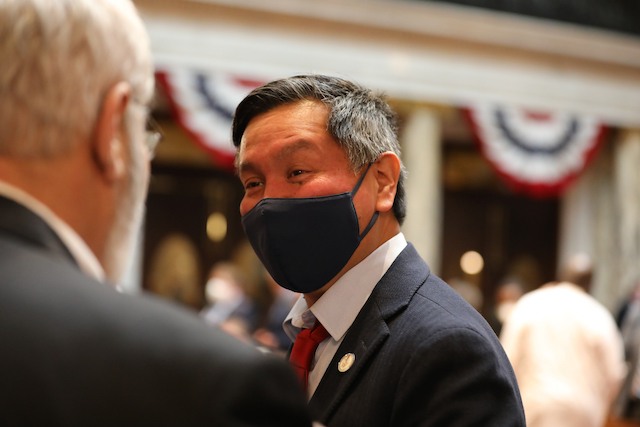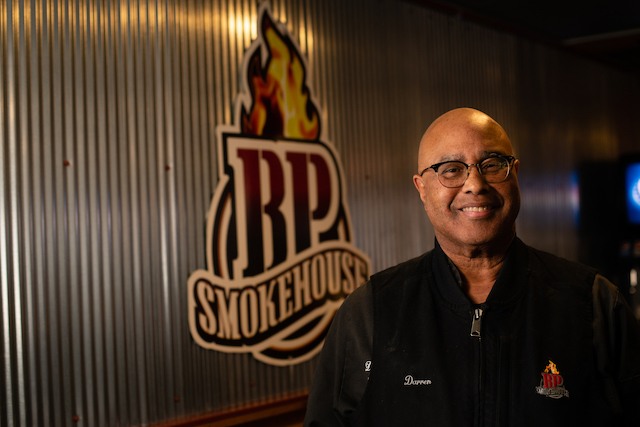The billboard project is expanding to Oregon
‘We’ve got to get gaming out of our blood’
Mario Koran
Wisconsin Watch

Players at Ho-Chunk Gaming Black River Falls in Wisconsin play at the blackjack table on Feb. 9, 2022. Tribes are now weighing how to diversify their economies beyond casinos. “When we see anything less profitable, there’s a thought of, ‘Is it worth it?’” said Ho-Chunk Nation President Marlon WhiteEagle of his tribe’s investment in casinos. (Photo by Ilana Bar-av for Wisconsin Watch)
Tribes contemplate the future beyond gaming after pandemic shows risk of overreliance on casinos
This story is part of a collaborative series, “At the Crossroads,” from the Institute for Nonprofit News, Indian Country Today, Wisconsin Watch and eight other news partners, examining the state of the economy in Indian Country. This reporting was made possible with support from the Walton Family Foundation.
Jackpots, left and right. That’s what Brent White Eagle most vividly recalls of reopening the Ho-Chunk Gaming Casino in Madison, Wisconsin, after the pandemic forced a closure that lasted more than two months in 2020.
Verifying each jackpot kept the former slots department supervisor on his toes as a skeleton crew of his colleagues adapted to pandemic life — installing plexiglass dividers between slot machines and covering shifts for staff who felt unsafe returning to work, he said.
Despite fewer gamblers on the floor, visitors made larger bets that triggered big prizes.
“There were quite a few nights where it was just off-the-wall jackpots. It was constant running for all of our employees,” White Eagle said. “The secondary maintenance that we had to attend to didn’t get done at all.”

Patrons didn’t complain as the payouts kept coming, but Ho-Chunk Nation officials hardly felt lucky as their government’s economic engine sputtered amid the public health crisis.
Two years later, casino officials say revenue is eclipsing pre-pandemic levels. But the pain from the temporary shutdown still lingers across Ho-Chunk Nation, manifested in layoffs and cuts to crucial services. That’s forcing tribal leaders to confront their economy’s outsized reliance on casinos.
“We were hit pretty hard by the pandemic,” said Ho-Chunk President Marlon WhiteEagle, no relation to the casino official. “And that begs the question of what we can do to move beyond gaming.”
Wisconsin’s 11 federally recognized tribes — along with tribal nations across North America — have long weighed how to diversify their economies, and the pandemic illustrated the risk of failing to do so.
Some tribes have turned to industrial hemp or land-leasing ventures; others have launched economic development arms to invest in manufacturing plants, construction companies and other enterprises.
The Ho-Chunk Nation has found little success with past efforts to diversify, facing turnover in government leadership, the failure of past business ventures and complacency with gambling earnings since that revenue began transforming tribal life in the 1980s, tribal officials said.
But WhiteEagle and some economists see promise in future development on Ho-Chunk land held in a federal trust. Others point to opportunities in federal contracting and by offering incentives for entrepreneurship.
“It takes courage to fail. And we’ve made a lot of courageous efforts,” WhiteEagle told Wisconsin Watch during a brief interview at his office in Black River Falls, Wisconsin. “But obviously we need to get back on the horse and keep trying.”
Pandemic shock
Casinos drive Wisconsin’s tribal economies, generating nearly $1.3 billion in net winnings a year before the pandemic’s disruption, according to the Wisconsin Department of Administration, which tracks gaming dollars. But by 2021, those winnings dropped by nearly a third to $893 million — an aggregate total that obscures the financial hit to individual tribes.
The revenue chiefly funds vital infrastructure and government programs like education, social services and tribal courts. Tribes don’t generally tax income to fund services, nor do they collect property taxes, since most tribal citizens live on trust land.
But the pandemic temporarily shocked that system in spring 2020.
The portion of net winnings that Wisconsin receives under compacts with tribes plunged by more than 99% between the 2019 and 2021 fiscal years — from $29.1 million to $154,000, according to the state’s Legislative Fiscal Bureau.
The largest three gaming tribes in Wisconsin — the Forest County Potawatomi, Oneida and Ho-Chunk — felt an immediate pinch as COVID-19 shuttered businesses. Potawatomi Hotel and Casino laid off 1,600 workers, the Milwaukee Journal Sentinel reported. And when the Oneida Nation reopened its Green Bay casino after a months-long shut down, it called back only about half of its workforce of around 900.
WhiteEagle said gaming typically contributes 75% of the Ho-Chunk Nation’s revenue, and the pandemic forced layoffs of roughly 2,250 Ho-Chunk employees, including more than 80% of its gaming workforce.
WhiteEagle announced the layoffs in a YouTube address to tribal citizens, fueling intense pushback and efforts to remove him from office. WhiteEagle did not specify how many positions would be restored in his next annual budget, but said management had previously been “top heavy,” with “more employees than we had work for them to do on a daily basis.”

Ryan Greendeer, a Ho-Chunk Legislature spokesperson and Army veteran, said he was pained to see the tribal veterans service officer laid off.
“Personally, I feel like that was a slight against veterans,” Greendeer said.
Among others laid off: Nelson Smith, a wildlife biologist who tracked wild bees and worked on elk rehabilitation until the pandemic. He now spends his days tanning deer hides, running family errands and looking for work. Casino work isn’t ideal, he said. He prefers the outdoors.
Nelson isn’t sure what the future holds. “Who knows, I might be living in my car this summer.”
White Eagle, the former casino worker, lost his job after taking medical leave and missing a deadline to file paperwork related to his leave, he said.
He’s looking for work in sports betting – now underway at the Oneida Casino in Green Bay and on a mobile app at certain Oneida Nation locations as part of a broader industry shift. The Forest County Potawatomi and St. Croix Chippewa Indians of Wisconsin also recently negotiated gaming compacts with the state to allow on-site sports betting, which remains illegal in Wisconsin outside of tribal operations. And tribal president WhiteEagle said sports betting is “on the horizon” for the Ho-Chunk Nation.
That comes as the Ho-Chunk plan to break ground on a $405 million casino complex in Beloit, hoping it will boost gaming revenue. That project requires a final sign off from the federal Bureau of Indian Affairs, but initial designs include plans for a multi-use facility that could be used for an education or healthcare center should gambling move online and brick-and-mortar casinos become a “thing of the past,” Greendeer said.
Humble beginnings for casinos
On a recent Wednesday night at Ho-Chunk Gaming Black River Falls, a crowd of patrons — most of them graying — sat beneath the blinking lights of slot machines, pulling levers in their pursuit of fortune. Rows of unoccupied machines left plenty of room for social distancing while a nearby blackjack dealer revealed each player’s fate one card at a time.
The Ho-Chunk Nation owns six casinos. The three largest rise just off of Wisconsin’s major interstate highways. They are in Madison, Wisconsin Dells and in Black River Falls, where the cranberry marshes meet pines and granite crags.
The easy access helped cement the tribe as an outsized player in Wisconsin’s gaming industry. That geography is no lucky accident. Long before the U.S. government forced the Ho-Chunk from their Wisconsin and Illinois lands — driving them west to Iowa, Minnesota, South Dakota and later, Nebraska — tribal ancestors walked the paths connecting Ho-Chunk villages and cultural sites along what today is I-94.
Unlike other tribes, the Ho-Chunk have no reservation in Wisconsin, but parcels of land hold reservation status. Instead 5,550 Ho-Chunk citizens in Wisconsin are scattered across the state on ancestral lands that the tribe repurchased or on privately owned land. Larger groups settled in the counties of Monroe, Sauk and Jackson — home to Black River Falls, the tribe’s seat of government.

David Greendeer, a Ho-Chunk citizen and former member of the tribal legislature who now works with the Mashpee Wampanoag Tribe in Massachusetts, recalls the pre-casino years when the Ho-Chunk struggled to maintain basic necessities. Even through the 1980s, Greendeer said, some families lacked running water. His family had no oven until the mid-1990s.
“My generation was the last to see people who lived in — according to today’s values — third-world conditions,” Greendeer said. “But people like my grandma didn’t see it as hard. It’s just what they knew.”
A transformation began in the 1980s after the tribe opened a tobacco shop out of a used trailer near Wisconsin Dells. Then came a bingo hall in the same place.
“Money started coming so quickly they didn’t know what to do with it,” Greendeer said. “We were literally putting money into wheelbarrows and taking it to places where it could be stored safely because we didn’t know what else to do with it.”
The next arrival: casinos, thanks to a series of court decisions and Wisconsin’s creation of a state lottery in 1987. By 1993, the Ho-Chunk opened their first casino — in the same spot as the original smoke shop.
The casino operations started small.
Samantha Skenandore is a Ho-Chunk citizen and an attorney who represents the Ho-Chunk Nation and works with more than 25 tribes and tribal companies. She remembers baking cookies with her grandmother to raise money to help the Oneida Nation make payroll — a common reality for tribes, including the Ho-Chunk, in the early days of casinos, she said.
“We started in a tent just like most tribes did, and we built our gaming enterprises into what they are today,” she said. “It’s pretty phenomenal.”
Aside from basic services, gaming revenue funds college scholarships and typically flows to tribal citizens through disbursements, more often referred to as “per cap.” Those quarterly payments reached about $12,000 a year per person before COVID-19.
But the tribal government cut or reduced some education support programs during the pandemic. It also halted regular per cap payouts, although federal pandemic relief has helped. The Ho-Chunk government each month is sending each adult $700 in monthly federal aid, set to expire in June, according to the Ho-Chunk Nation Legislative Branch. That’s on top of the $3,000 in federal funds WhiteEagle sent last year to each adult, along with $1,500 to minors, amid his conflict with the legislature.

Outside of gaming, the tribe owns and operates five convenience stores, generating revenue that became crucial when casinos closed. It also has three hotels and the Ho-Chunk RV Resort and Campground, just outside of Wisconsin Dells. The tribe’s health department generated nearly $9 million in 2019.
Still, gaming delivers three-quarters of tribal revenue, said WhiteEagle. He declined to provide a dollar figure, citing tribal confidentiality laws, but said the tribe brought in around $500 million from all revenue sources before the pandemic — including gaming and state and federal grants.
‘A real serious problem’
Private industry typically drives non-Native economies, but administration and recreation dominate many tribal economies nationwide, making government and casinos the top employers, said Patrice Kunesh, the founder and former director of the Center for Indian Country Development at the Federal Reserve Bank of Minneapolis.
Casino jobs often pay well and include health care and retirement benefits. But depending so heavily on one industry is a gamble that leaves the tribes vulnerable to economic shocks, said Kunesh, who is of Standing Rock Lakota descent.
Governments of all types have faced similar challenges. Examples include West Virginia and other states that suffered widespread hardship after the coal industry declined, Kunesh said. States like Alaska, North Dakota and Wyoming still largely depend on oil and gas taxes to fund services. In the 1800s, North American tribes faced a catastrophic shock when White settlers decimated the bison herds that tribes depended upon, Kunesh said.
“Tribes are facing a real serious problem here with the concentration of their businesses,” Kunesh said. “We need a private economy that can continue and hum along and not throw your reservations into such chaos and turmoil.”
Projecting long-term gaming profits is difficult, Kunesh said. Questions loom about the long-term profitability of brick-and-mortar casinos. They face competition from certain online and mobile forms of gambling — including sports betting — and other entertainment. A 2018 U.S. Supreme Court ruling lifted a federal ban on sports betting, allowing states to regulate the industry. While Wisconsin currently limits sports betting to tribal sites through negotiated compacts, a growing number of other states have more widely allowed forms of sports betting. Wisconsin continues to ban most online forms of gambling.
Tribes may need to explore opportunities elsewhere, particularly as the brick-and-mortar clientele ages.
“Right now our baby boomers are there. They’re the sustainable market,” said Jon Warner, a Ho-Chunk Gaming business development manager.
He spoke to Wisconsin Watch on the Ciporoke podcast, which tackles issues facing the Ho-Chunk Nation. He was speaking as a citizen, not in his official capacity.
“We’re fairly confident that we’ve got 20, 30 years of brick-and-mortar (casino profits) for us,” Warner said. “After that, it’s going to change.”
Diversification efforts fall short
Ho-Chunk citizens have long called for economic diversification, WhiteEagle told Wisconsin Watch, and he pointed to several past efforts that fizzled.
In 2003, the tribe introduced a bottled water brand called Ni Sini — “cold water” in Ho-Chunk — but it abandoned the project after struggling to break into new markets, WhiteEagle said. The same year, the tribe opened a $3 million Marcus Ho-Chunk Cinema in Tomah that closed during the pandemic and hasn’t reopened. Weeds now sprout from cracks in the empty theater’s parking lot. The tribe is exploring reopening, but that would require reinvestment in the property, WhiteEagle said.
Similar episodes have played out in other tribes.
After losing money on out-of-state casino projects, the Lac du Flambeau Band of Lake Superior Chippewa in northern Wisconsin ventured into payday lending, partnering with outside lenders who sought to avoid state and federal consumer protection regulations.
The operation charged interest rates as high as 400%, prompting critics to call it predatory and ensnaring the tribe in litigation targeting its role in the operation.
The Menominee Indian Tribe of Wisconsin tried to break into the hemp market after Congress legalized it for research purposes. But in 2015, a swarm of federal drug agents destroyed 30,000 Menominee cannabis plants — despite shaky evidence that the plants contained illegal levels of THC, the psychoactive component of marijuana.
Still, industrial hemp holds promise for tribes — as does marijuana should it become legal in Wisconsin, said Skenandore, the Ho-Chunk attorney. Tribes have effectively regulated the market, she said.
“Tribal nations are just really good at regulating the sins of the world — gaming, tobacco, cannabis — all of these industries the government can’t handle the political pressure of regulating,” Skenandore said.
Despite the setback for the Menominee, the nearby Oneida Nation is exploring hemp cultivation while navigating bureaucratic red tape. Meanwhile, the Menominee are building a new sawmill and adding maple syrup production.
The Menominee’s sawmill was its biggest money-maker before casinos, but has failed to generate profit in recent years — largely due to a shortage of skilled loggers.
Nebraska tribe finds success
Looking to the west, Warner said he envies the Winnebago Tribe of Nebraska — a separate tribe that shares ancestry with the Wisconsin Ho-Chunk. He sees economic success where his tribe has stumbled.
The Winnebago Tribe began diversifying in the 1990s, when new Iowa casinos threatened profits of the tribe’s WinnaVegas Casino, located just on the Iowa side of the border because Nebraska had yet to authorize gaming at the time.
The Winnebago Tribe created an economic development arm, Ho-Chunk Inc., which spurred an array of enterprises, including construction, real estate development, home manufacturing and tobacco growing. The corporation also secures IT and administrative contracts with the federal government — aided by a federal law that gives preference to tribes during bidding.
In 1994, its first year of operation, Ho-Chunk Inc. raised $400,000 in revenue, which more than tripled the next year to $1.5 million. This year, it will clear $370 million in non-gaming revenue.
“And we’re doing it from one of the poorest places in Nebraska,” said Lance Morgan, president and CEO of Ho-Chunk Inc.
Federal contracting played a large role in that success, Morgan added.
Securing federal contracts can be difficult for tribes that lack capital needed to launch an enterprise, Morgan said. But even those with more modest budgets can succeed by wisely leveraging funds.
‘Mom and pop’ mentality
Tribal leaders and Ho-Chunk citizens attribute slow economic progress to frequent leadership turnover and a complacency tied to a lucrative gaming market. But among barriers to growth, those interviewed name one hurdle above all others: The struggle to separate government from business.
In some ways, the two are naturally intertwined. That can lead to inefficiencies and inconsistent strategies as leadership rotates.
“Leaders are only in place for a short period of time, so they might come in, look at the enterprises started under the previous leaders, then decide to scrap them because they weren’t profitable enough,” said Nathaniel Longtail Jr., executive accounts manager for the Ho-Chunk Nation.
Gaming’s success also slows diversification efforts, WhiteEagle said: Other ventures pale in comparison to an industry that can generate 15%-20% profit margins.
“When we see anything less profitable, there’s a thought of, ‘Is it worth it?’ And then it stalls out,” WhiteEagle said.
Dan Brown, executive manager of Ho-Chunk Gaming Madison, described a “mom-and-pop-checkbook sort of mentality” within the Ho-Chunk government. Government leaders don’t always seek ideas from more experienced business leaders, Brown said. Like Warner, Brown was speaking on the Ciporoke podcast and not in his official capacity.
The tribe’s last strategic business plan expired in 2015, Warner said.
“I think we’ve become very spoiled,” he said. “We’re completely complacent with what we’ve been given. We are able to survive with what we have, and it has become the status quo.”
Warner added: “We’ve got to get gaming out of our blood.”
Warner and Brown said the Ho-Chunk should encourage citizens’ entrepreneurial spirit.
“Once you become an owner of a business, you understand what the tribe’s businesses need, therefore the tribe can expand itself and create a bit and make a better life for all of us,” Warner said.

Spirit-driven BBQ
Darren Price has that entrepreneurial spirit. Over 22 years, Price and his Ho-Chunk family transformed a small catering business into a brick-and-mortar barbecue joint — BP Smokehouse in Tomah — by sticking to a business plan that mirrored Price’s cooking style: one step at a time.
Price was working as a State Highway Patrol trooper around 2000 when he spotted a newspaper advertisement. The Ho-Chunk Legislature was offering a $10,000 small business grant and looking for applicants. Price immediately charted a business plan that was among a handful picked as winners.
Price hit the competitive BBQ circuit, snagging prize after prize, at one point appearing on the Food Network. The business grew as patrons kept returning.
Price, who doubles as a Pentecostal pastor, slips into parables and scripture while addressing the patience, faith and passion he has poured into his business.
“It can be lonely at times,” he said, recalling the solitude of waking before dawn to start the grill and prepare the meat. “But you’ve got to have that dream and that vision, you have to nurture that. Because it’s yours.”
BP Smokehouse takes its name from the combined initials of Price and Blackdeer, the maiden name of his wife, Myra Jo. The couple just opened a second location, a kiosk in the Ho-Chunk Casino in Nekoosa.
“My desire has always been to be in every one of the (Ho-Chunk) casinos as a marquee food vendor,” he said. “So that people can see that if you follow the basics and your passion, you too can establish your business and be an integral part of a larger community.”
On an early February afternoon, wood smoke wafted through a small dining area as the restaurant filled with local workers, young men Price once coached in high school and uniformed soldiers from nearby Fort McCoy.
Price employs 15 workers between his two locations, most of whom are Ho-Chunk.
The Ho-Chunk government has since abandoned the small-business program that gave BP Smokehouse its start, but WhiteEagle said the tribe aims to restart a similar small business loan program.
Looking to the future
Tribes would be wise to use the “tremendous” amount of federal pandemic relief for long-term investments in education, workforce development — or seed money for entrepreneurs like Price, Kunesh said. But some tribes — including the Ho Chunk — have instead sent those funds directly to citizens through per cap payments, which she said is often “more of a political calculation.”
Meanwhile, Kunesh said, tribes are underutilizing their greatest asset – land. A federal Bureau of Indian Affairs trust holds more than 60 million acres of land across Indian Country.
The bureau has historically governed the land’s uses, requiring sign-offs for activities like oil and gas drilling, agriculture, housing or commercial businesses. But a 2012 federal law allowed tribes to make those decisions in-house — once they developed federally approved leasing regulations.
With 6,633 acres of trust land, Wisconsin’s Ho-Chunk Nation became an early case study for how tribes can efficiently govern use of their own trust land — by creating a realty division to manage its own leasing agreements .
WhiteEagle said such creativity could pay off if the tribe opens those lands for commercial use.
“We could attract large corporations that contribute to our tribal economy through taxes or fees,” he said, pointing to a store and repair shop Tesla recently opened on tribal land in New Mexico.
For the past several years, the Oneida Nation has generated revenue by leasing tribally owned land that overlaps with the city of Green Bay. Today, the area is home to Walmart, Festival Foods, Home Depot and other large box stores.
Despite the past diversification stumbles, Warner and Brown remain hopeful that the Ho-Chunk Nation tribe will “get out of (its) own way” and come together for its future.
“It’s just really about trying to have all of us build each other up,” Warner said. “We are a really powerful, strong tribe, and we’ve forgotten it.”
Frank Vaisvilas, Native American Affairs reporter for the Green Bay Press-Gazette, contributed to this report.
This story is part of a collaboration from the Institute for Nonprofit News Rural News Network in partnership with INN members Indian Country Today, Buffalo’s Fire, InvestigateWest, KOSU, New Mexico In Depth, Underscore and Wisconsin Watch, as well as partners Mvskoke Media, Osage News and Rawhide Press. Series logo by Mvskoke Creative. The project was made possible with support from the Walton Family Foundation.The nonprofit Wisconsin Watch collaborates with WPR, other news media and the University of Wisconsin-Madison School of Journalism and Mass Communication. All works created, published, posted or disseminated by Wisconsin Watch do not necessarily reflect the views or opinions of UW-Madison or any of its affiliates.
External
Identification not yet made
UTTC International Powwow attendees share their rules for a fun and considerate event
Radio collaboration highlights importance of cooperation in a season of funding cuts for local media
A memorial in the Snow County Prison, now the United Tribes Technical College campus
Standing Rock Sioux Tribal Chairwoman Janet Alkire tells crowd, ‘We’re going to rely on each other’






